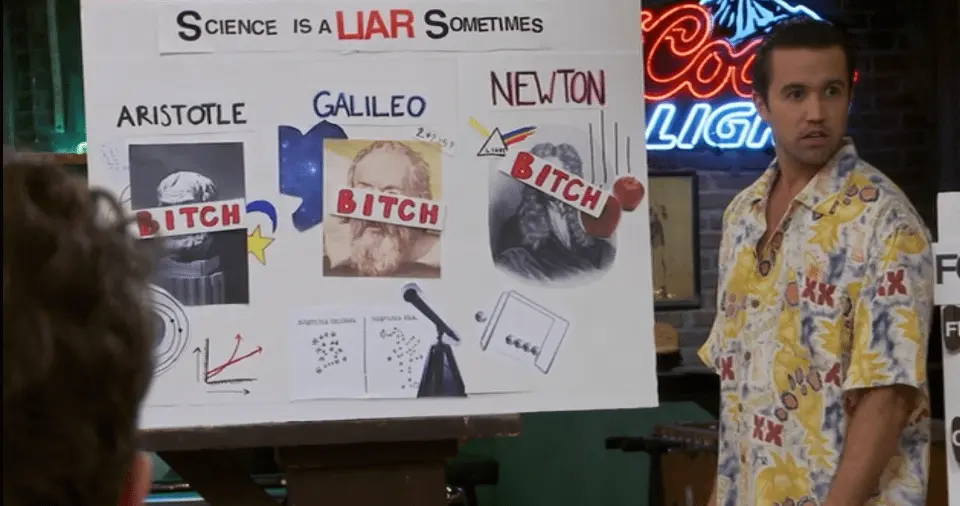This might be heresy, but I feel like saying that “science isn’t truth, it’s the search for truth”, and “if you disagree it’s not a disagreement, you’re just wrong” is internally inconsistent.
It needs to be “if you disagree without evidence.”
They can leave that whole “if you’re not a scientist” bit in the rubbish bin.
If you disagree without evidence, you’re not wrong. You can propose an alternative theory that is consistent with existing evidence and it’s just as valid as anybody else’s. The mission is then to find evidence which disproves one theory or the other.
Conjecture is fundamental.
If you disagree without evidence you may, even by pure chance be correct, however without evidence and methodology to discuss it, you may as well be wrong.
Without new evidence, disagreeing with established science is being wrong. Young earth creationists are wrong because they have no new evidence to contradict established science. Even thoigh the age of the earth was scientifically calculated multiple times and could be revised again with new evidence, flat earthers are wrong because conjecture about existing knowlege without evidence is just being wrong.
A young earth creationist’s hypothesis does not agree with existing evidence and so your example does not refute my argument.
No, that’s the point. Disagreeing is already part of the scientific method. To disagree with science as a whole is to argue with the method, not the findings.
Imagine two explorers searching for a lost ancient ruins. They come to a path running north/south. One says to go north and the other says south. That’s a disagreement. They are both still explorers seeking discovery.
A third observer sees them arguing and says “Ah, you don’t know the way. We should not be seeking ruins because I already know what is there. I was told in a dream that the ruins were made by Bigfoot, and he made them invisible and impossible to see. Searching is futile, but I can draw you a map from what I already know is there.”
That’s not a third opinion of equal validity. It’s not even a disagreement. It’s just being wrong.
While I do agree with what you’re saying, and it’s a way of reading it I hadn’t considered, I don’t think the distinction is clear from the meme. Then again, it’s just a meme, so my expectations can probably stand to be lowered a bit.
I feel it should say something like “science isn’t ‘unchanging truth’, written in stone, but rather the unending search for truth”.
The part which annoys me is about intentions.
Sure, lobby groups do pay off some people with a PhD to lie for them (Patrick Moore), that’s not up for debate.
But to imply that this is the norm is just ignorant of how research is conducted.
Most scientists are either employed by a company, working towards a very specific, non contentious goal (like developing cold fusion), or are involved in research at a university, paid for in grants by their government to research whatever has been approved as worthy of investigation.
Nobody is pressuring these researchers to find evidence to support any particular agenda, the chips land where they fall. There’s no fat cat smoking a cigar telling the climate science team at their local university that they need to find more evidence to crash the petrol stocks so they can sell more solar panels.
Nobody? There are quite a few counter examples. Cigarette and fossil fuel companies have done this quite a lot.
Isn’t the sugar industry responsible for everyone thinking fat is the main cause of heart attacks instead of sugar?
There is no need to actually bribe researchers. IT is much more effective to find some that happen to already be in your favor and boost their signal.
Say that out of 100 scientists of the relevant field, 90 think your product is toxic, two think your product is perfectly safe, and the remaining eight think that the evidence is not strong and/or significant enough to determine the product’s danger. Because as much as we’ve wished science to be clear-cut and deterministic, and as much as the scientific method tries to root it out, human’s opinions and prejudices will always have some effect. Maybe after many decades science will reach a (near) 100% consensus - but your product is still new, so disagreement can still be found.
You can try to bribe these 98 scientists to say that your product is safe, but that’s a risky move because even if a handful of them has some conscious they can go public with it and you’ll have to deal with bad PR. So instead, you reach out to the two scientists that already think that it is safe. You fund their research, so that they can publish more papers. You send them to conferences all around the world, so that they can talk to other scientists and to journalists and spread their opinion on your product. You get your marketing/PR/social media teams to increase the reach of their publications.
These two scientists are not being “pressured” - they can still honestly claim that their belief in your product is not a result of the money you spend on them, and that will be true. The thing that is a result of the money you spend on them is their impact. These 90 scientists that warn against your product can’t conduct as many researches, because they need to find funding for these researches themselves. They can’t go to as many conferences, because they don’t have anyone working their connections to get them invited (and to pay for their flight tickets). They don’t have professional promoters advertising their findings.
So even though only two scientists support you while 90 oppose you, these two scientists have - thanks to your money - more impact on the public opinion than these 90.
All without any scientist having to utter a single lie.
“The Science is settled” and “I believe in Science” are both equally frightening sentences.
I completely agree. A lot of the time “I believe in science” is usually used in reference to comparing it to feelings or faith, and in those cases it makes sense to say you trust science over someone’s gut feeling or their “own research”. If you are someone who just blindly goes around proclaiming “I believe in science” then you need to go back to school and take a critical thinking course.
I’ve had people tell me things were impossible because they “Aren’t in our list of known unknowns” or they violate some principle for vague reasons they don’t understand… then a month later an article shows up saying “We proved that thing Sera said was totally possible”
Scientism is such cringe
Sadly I find people who most proudly preach the wonders of Critical Thinking, are the ones least capable of it.
Depends on your audience.
If your audience is stupid, tell them to stfu and listen to the science. They’re too dumb to think about why they believe anything, they just need to be told what to believe. So as a bulwark against religious superstition, you tell them to stfu and listen to science.
If your audience is intelligent, then there’s no risk of them being suckered in by religious superstition, then you can have a discussion about the merits and processes of current scientific methods and theories, differing viewpoints, and degrees of confidence in the scientific community.
This applies to a lot of topics.
Talking to a stupid independent voter? “Vote for Biden or Trump will destroy democracy.” Talking to a smart independent voter? “Biden is definitely wrong on several issues, we should try to push him in a better direction.”
Talking to a stupid computer user? “Don’t try to change any of these files.” Talking to a smart computer user? “Here’s what happens when you change these files.”
To a stupid person, about the economy: “listen to the data!”
To a smart person, about the economy: “The metrics which the CPI uses are flawed.”
Etc etc. There’s always a complex, nuanced, correct answer, and a simple, straightforward, wrong answer. Because reality is complicated. So for stupid people you give them a simple, straightforward, mostly true answer to combat the simple, straightforward false one vying for their pair of brain cells.
True, but I feel like this should be saved for the dumbest of the dumb. Too much cringe has been created by things like Rational Wiki inadvertently getting otherwise intelligent people to believe that doing science is just the ability to shout the name of a fallacy you feel your opponent has committed, whilst oversimplifying anything you don’t understand until it sounds stupid… Ya know like Evangelical Fundementalists do to defend their biblical literalism?
It has culminated into a behavior I like to call the Fallacy Fallacy
It leads to shit like this
Normal Person: The doctor says I have cancer, but it’s still treatable, so I should take this medicine, it’s expensive, but it’ll be worth it.
Scientism Worshipper: I dunno, you think you have cancer because the doctor told you? Sounds like an appeal to authority. Normal Person: Look, my aunt ignored her diagnosis and she was terminal within weeks and dead within days after that. I’m not taking any chance
Scientism Worshipper: Hrmm… So the only thing that has you trusting this doctor is anecdotal evidence?
Normal Person: You’re right! These meds are too expensive anyway -Weeks Later-
Scientism Later: Well my friend is dead
Third Party: Because you killed him, he died because he didn’t take his medicine…
Scientism Worshipper: CORRELATION IS NOT CAUSATION YOU BIBLE-THUMPER! GO BACK TO WORSHIPPING YOUR SKY-DADDY SHEEPLE!
That’s a Strawman in and of itself, but you get my point
Now it may sound like “Well, I guess we shouldn’t question the science then.”
No, always question the science, that’s how you do science. The problem comes when you think you’ve mastered the science so well (despite evidence to the contrary) that you refuse to let what you know to be questioned.
Are these people really “otherwise intelligent” though?
Given that a lot of them are in my writing group, I’m going to say yes.
It sounds to me like they should be at the “stfu and listen to science” little kids’ table if they’re in danger of falling victim to superstitious bullshit.
Science is not the truth. Science is a mechanism for finding the truth.
Companies**. Also, the word they’re looking for is hypothesis, not theory.
The most annoying thing about all those arguments is the complete misunderstanding of what “theory” actually means.
Any argument that centers on the phrase “scientific theory” instantly goes in the trash and should tell you all you need to know about the person making it

Haha I love this
The comment has some merit, some. Look at low fat foods and sugar for instance.
But I’ll be honest, there’s no “big science” I went to grad school for physics, taught physics, fuck publish or perish.
I now make a fuckton of money writing code and designing algorithms. Haven’t published in over a decade.
Ok but there’s a given value of this. I have a friend with a PhD in hpv. On matters of hpv I’m definitely wrong if I’m arguing with her, and same for any matter of microbiology or virology. I’m probably wrong in any argument with her about any biology. But when we start talking physics? Nah I’m an engineer and she studies a cancer virus. I’m more likely to be right about how electricity works. Astrophysics though? We might as well be art majors.
Yea but I’d like to think most people who are educated in 1 field to know to “stay in their lane” so to speak, and trust the experts in other fields.
I’d like to think that too, but I keep being proven wrong. There’s plenty of people who think that their expertise in one realm means they have expertise in many other realms.
Ha!
I think you’re right, and maybe add a modification. As a fellow engineer, I’ll suggest there’s a third option that’s more realistic when it comes to knowledgeable and lay people having a discussion:
- as mentioned in the meme, scientists can and do learn stuff that improves overall understanding.
- the quest for improved understanding is usually sparked by a strange or unique observation, sometimes by scientists, sometimes by the much larger population of regular folks
- Provided there is good intent and respect from both parties, I believe it’s critically important that people who have observed something unique be able to discuss it somehow with people who have particular skill related to that phenomena
What seems to be missing out of a lot of these misinformation tikTube fights is precisely that fundamental lack of respect. I’ve observed it’s very easy to destabilize a calm discussion with small amounts of inconsiderate speech by people within or outside the discussion. Sometimes it seems purposeful, but the result is a much slowed ability to communicate. That’s bad for us all.
Having qualifications doesn’t automatically make you right. Having data and logic makes you right. It is more likely that she is correct in any discussion about her subject of expertise, but having a degree doesn’t make her automatically correct and you automatically wrong. That attitude is the exact opposite of the principles of science.
You’re going in the chokey for using an obscure abbreviation without saying what it means.
Oh sorry, it’s a doctorate in philosophy, it means she’s advanced scientific knowledge and has been recognized by the scientific community for it and now has the right to be addressed with the title Doctor.
It’s ironic that what most people think of as a highly intelligent person is a polymath aka somebody who is an expert in multiple topics.
Academia today is designed for extreme specialization of knowledge. So it actively selects against anyone that would be classified as a polymath.
It’s a pretty big disconnect between expectations and reality.
He has a degree in Human Papillomavirus? Did he get it from Florida State?
Bravo
Idk how to curtsy online….
No one’s a winner in this exchange.
The replier doesn’t even know the plural for “company”
Why are we elevating this anti-intellectual drivel?
That’s literally the opposite of what “theory” means in a scientific context. You know nothing of science and your opinion is wrong.
In my ethics course during the phd program, I was told this was actually a good thing. Their example was pharma companies know how to use their drugs better so they get better results, more true results. If that was true, it’s unfortunate it’s not the pharma company that also handles treatments then. That course also said that software patents does not exist as a concept.
Yeah, if I test my software all is good as well. As soon as the customer does something, he finds bugs, because I didn’t thought about that situation.
As the drug user in the end isn’t qualified enough, they should exactly test like that and not just what they think is right
But maybe my analogy isn’t completely working in that case…
There are several problems here. One being you cannot train every nurse or everyone self-adminestering the medicin to be a professional in it. Which was the hidden assumption made in the course. So “test it exactly like that” does not really work.
I think, I worded it wrong
Testing exactly for the results you expect is a good start to verify functionality, but you also need tests, that can bring up whatever, so you get a better view of the risk profile
But I’m not a pharmacist, so I’m just taking out of my ass anyway
Big Gravity clearly paying folks to say stuff falls down so they can sell more floors.
Read Socialism: Utopian and Scientific by Friedrich Engels
They kind of backed up over their own message there.
deleted by creator










